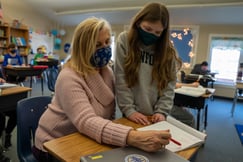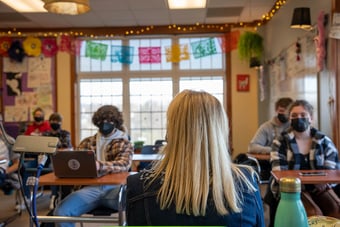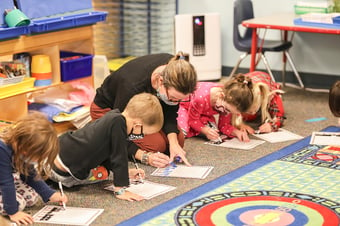 There's currently some frustration among educators around the lexicon of COVID. Teachers and school staff have probably grown weary of the descriptions we as school leaders have used as our communities have navigated the pandemic. Words like “flexible,” “nimble,” and “pivot” didn’t carry emotional weight before March 2020.
There's currently some frustration among educators around the lexicon of COVID. Teachers and school staff have probably grown weary of the descriptions we as school leaders have used as our communities have navigated the pandemic. Words like “flexible,” “nimble,” and “pivot” didn’t carry emotional weight before March 2020.
Same words, new meanings
These terms – maybe overused during the past two years – mean something, often not positive, to folks who have lived and worked through the COVID era, especially classroom teachers.
You see, classroom teachers spend their days pivoting; to meet the needs of all learners, they are both nimble and flexible in their approach with students. So when we as school leaders ask them to take all of those attributes, which are necessary on a normal day and in a typical school year, and effectively double and triple their efforts–a challenging job just got much more difficult.
Supported teachers can do their jobs better
Making the effort to support your child's teachers can have a profound impact on your child's educational experience. By incorporating the following strategies into your relationship with your child's teachers, you will help to reduce some of the strain they're under from pandemic-induced back bending. 
- Maximize the partnership between home and school, particularly if you experience a life change. Communicate with the school whenever you have questions or concerns. Should your family experience a life change (move, separation/divorce, sickness, etc.), inform your child’s teacher, advisor, or counselor so that they can support your child. If a difficult situation occurs at school, reach out to faculty members with the goal of further understanding the situation rather than formulating a conclusion at the time the issue is brought to your attention.
- Be on the lookout for school communications. Emails, text messages, and phone calls allow teachers and school leaders to share information quickly and effectively. When you receive messages from the school, check them as soon as possible so that you're in the loop of schedule changes, new health and safety protocols, and other information. If a teacher reaches out with an inquiry or concern, make sure that you respond promptly.
- Respect boundaries during nights and weekends. Re-energizing is important even when life isn’t throwing curveballs. During challenging times, teachers and counselors are working in overdrive. If you need to contact someone at school regarding a non-emergency situation, avoid reaching out during nights and weekends so that they have an opportunity to rest and recharge.
- Be sensitive to and ready for change—some of which may occur with short notice. Processes and decisions are often affected by fluctuating COVID cases, government mandates, and public health recommendations. While advance planning and notifications are ideal, sometimes they're not possible.
- Remember the power of positive feedback. If you appreciate the dedication, actions, and efforts of teachers or others at the school, let them know. Positive messages are huge morale boosters in the world of education.
- Encourage your child to go directly to their teachers, advisors, coaches, or counselors to discuss school-related questions and concerns. Students sometimes expect their parents to be omnipotent about schoolwork, policies, programs, schedule changes, and other school-related matters. However, information and data can become outdated due to swiftly changing conditions, and parents shouldn't bear the responsibility of having all the answers all the time. When students pose questions directly to school officials, it helps them build self-advocacy skills and ensures that they avoid receiving conflicting or inaccurate information.
When these practices are regularly implemented, the support will empower educators to bring their best selves to the work of educating your child.

Thank you, teachers
As we approach the two-year anniversary of the start of the COVID-19 pandemic in our country, I salute classroom teachers everywhere – in public and private schools – who have kept our children learning and growing. Whether it was at home via Zoom or in the classroom, distanced and with masks, my colleagues have continued to dig deep... and yes, they have done so with frequent nimble pivots, displaying a tremendous amount of flexibility.
When this COVID era ends (and it WILL end) I hope these are attributes that Sanford teachers and community members will bring to our students for years to come.









